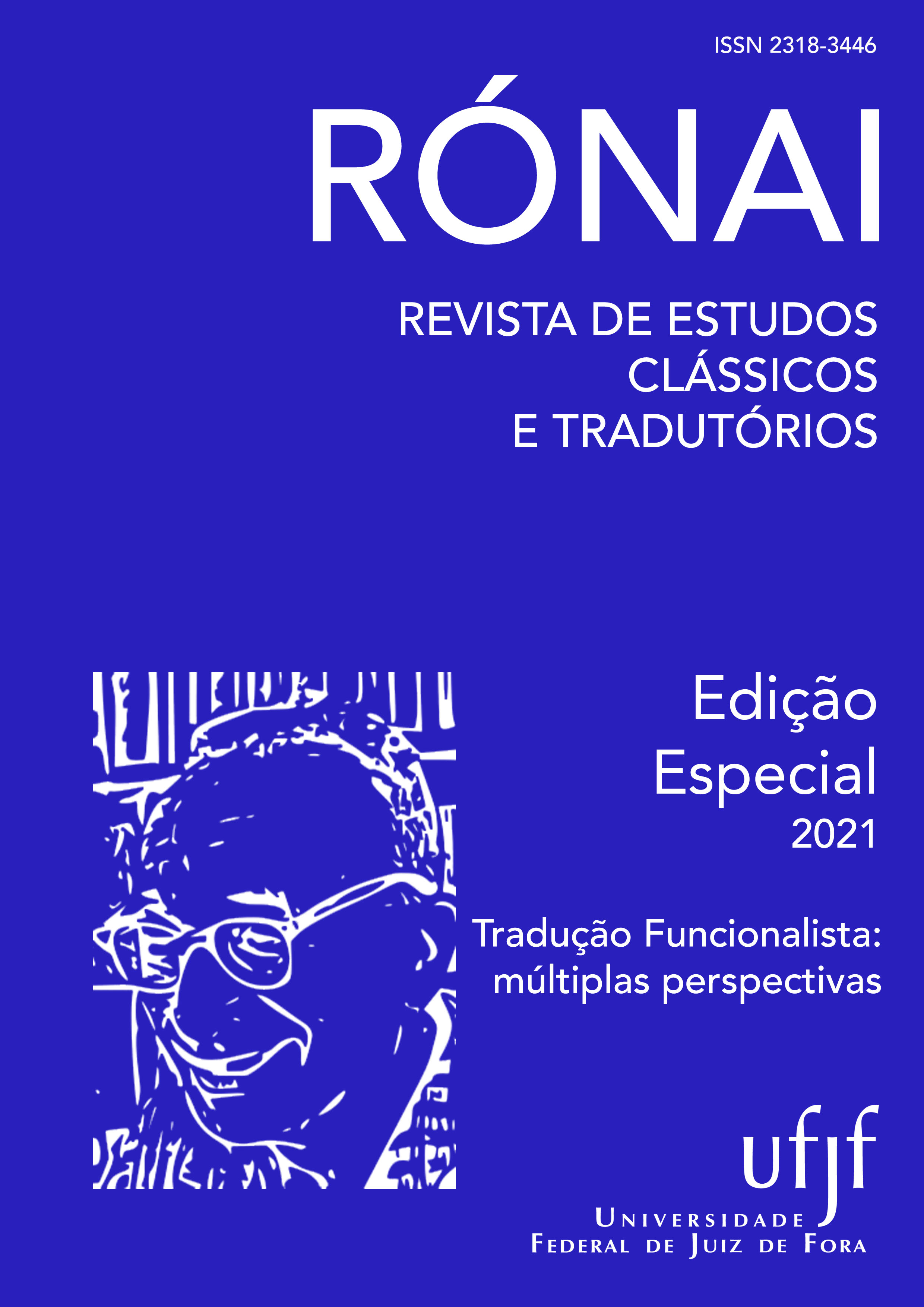Possibilities of a Didactic Sequences (SD) from the functional translation of automatic subtitles for the teaching of linguistic variation in Spanish
DOI:
https://doi.org/10.34019/2318-3446.2021.36183Keywords:
subtitling, didactic sequences, Spanish language, basic educationAbstract
Investigations within the field of Translation Studies have already demonstrated the didactic advantages provided by combining Functionalist Translation with the Didactic Sequences (DS) procedure (LAIÑO, 2014; PEREIRA, 2016). Thus, in this article we propose an initial DS project based on the functional translation of automatic subtitles of some fragments from the film Metegol (2013) in different linguistic varieties to Brazilian Portuguese. To do so, we resorted to Christiane Nord’s Functional Translation literature, and the Didactic Sequences procedure as proposed by the Geneva School along with some adaptations proposed by Pereira (2016). The methodological approach we seek to develop is based on a literature review on functional translation in Didactic Sequences, subtitling and remote teaching to support the proposition of an initial DS project adaptable to the teaching of Spanish in basic education. The proposed DS could raise awareness about the linguistic variation of Spanish and enable the perception of the translation process involved in subtitling.
Downloads
References
ARAÚJO, V. L. S. O processo de legendagem no Brasil. Revista do GELNE, v. 4, n. 1, p. 1-6, 26 fev. 2016.
BEATO-CANATO, A. P. M.; CRISTÓVÃO, V. L. L. Proposta de avaliação de sequências didáticas com foco na escrita. In: BARROS, E.; RIOS-REGISTRO, E. S. (orgs.) Experiências com sequências didáticas de gêneros textuais. Campinas: Pontes Editores, 2014. p. 203-233.
CRUZADO, N. M. A tradução de legendas e suas contribuições no Ensino-Aprendizagem de Leitura em Inglês como Língua Estrangeira. 174f. Dissertação (Mestrado em Linguística e Língua Portuguesa) — Universidade Estadual Paulista "Júlio de Mesquita Filho", Faculdade de Ciências e Letras, Araraquara, 2019.
DEMÉTRIO, A. P. C. A tradução como retextualização: uma proposta para o desenvolvimento da produção textual e para a ressignificação da tradução dentro do ensino de LE. 2014. 198f. Dissertação (Mestrado) – Centro de Comunicação e Expressão. Universidade Federal de Santa Catarina: Florianópolis, 2014.
DOLZ, J.; NOVERRAZ, M; SCHENEUWLY, B. Sequências didáticas para o oral e a escrita: apresentação de um procedimento. In: ROJO, R.; CORDEIRO, G.S. (trad. e org.) Gêneros orais e escritos na escola. Mercado de Letras: Campinas, 2004, p. 95-128.
FREIRE, A. PAIVA, D.; FORTES, R. Acessibilidade Digital Durante a Pandemia da COVID-19 - Uma Investigação sobre as Instituições de Ensino Superior Públicas Brasileira. Revista Brasileira de Informática na Educação – RBIE, 28, 956-984, 2020. Disponível em: https://www.br-ie.org/pub/index.php/rbie/article/view/v28p956. Acesso em: 10 jan 2022.
LAIÑO, M. J. A tradução pedagógica como estratégia à produção escrita em LE a partir do gênero publicidade. 2014. 234f. Tese (Doutorado em Estudos da Tradução) – Centro de Comunicação e Expressão. Universidade Federal de Santa Catarina, Florianópolis, 2014.
MAQUINÉ, G.; COELHO, I.; FIGUEIREDO, S. Ferramentas digitais para o ensino remoto de línguas adicionais em tempos de pandemia: considerações sobre o Duolingo. Revista de Estudos e Pesquisas sobre Ensino Tecnológico, Amazonas, v. 6, Edição Especial, 2020, 1-20.
MOREIRA, J. A.; SCHLEMMER, E. Por um novo conceito e paradigma de educação digital onlife. Revista UFG, v. 20, 2020.
NORD, C. Text Analysis in Translation: theory, methodology and didactic application of a model of translation-oriented text analysis. Tradução de Christiane Nord e Penelope Sparrow. Amsterdam; Atlanta: Rodopi, 1991.
NORD, C. Texto-base-texto-meta. Un modelo funcional de análisis pretraslativo. Tradução e adaptação de Christiane Nord. Castelló de la Plana: Publicacions de la Universitat Jaume I, 2012.
PALACIO, J. I. La enseñanza de las lenguas en tiempos de pandemia. Newsletter N° 44: Dossier especial: Enseñanza virtual en la escuela secundaria: cómo propiciar experiencias de aprendizaje significativo en tiempos de COVID-19, 2020. Disponível em: https://www.soc.unicen.edu.ar/index.php/categoria-editorial/278-newsletter/n-44/4074-newsletter-n-44-dossier-especial-la-ensenanza-de-las-lenguas-en-tiempos-de-pandemia. Acesso em: 10 jan 2022.
PEREIRA, L. L. O. A tradução de textos teatrais como recurso didático para o ensino da variação linguística no uso das formas de tratamento em espanhol a aprendizes brasileiros. 2016. 316f. Dissertação (mestrado) - Universidade Federal do Ceará, Programa de Pós-Graduação em Estudos da Tradução, Fortaleza, 2016 Disponível em: http://www.repositoriobib.ufc. br/00002d/00002d1a.pdf. Acesso em: 26 nov de 2021.
REISS, K.; VERMEER, H. J. Fundamentos para una teoría funcional de la traducción. Tradução de Sandra García Reina e Celia Martín de León. Madrid: Ediciones Akal, 1996. 206p.
RIVAS, A. Pedagogía de la excepción: ¿cómo educar en la pandemia? Documento de trabajo. Buenos Aires: Universidad de San Andrés, 2020. Disponível em: https://www.udesa.edu.ar/sites/default/files/rivaseducar_en_tiempos_de_pandemia.pdf. Acesso em: 11 out 2021.
SILVA, T. F. Pela lente da legenda: um estudo de caso na recepção audiovisual. 2009. 197f. Dissertação (Mestrado em Linguística Aplicada) – Universidade de Brasília, Brasília, DF, 2009.
Corpus
METEGOL. Direção: Juan José Campanella. Produção: Ricardo Freixa. Argentina/ Espanha: Universal Studios, 2013.
Downloads
Published
How to Cite
Issue
Section
License
Copyright (c) 2022 Valdecy de Oliveira Pontes, Livya Lea Oliveira Pereira

This work is licensed under a Creative Commons Attribution 4.0 International License.
Copyright
The authors of the published contributions agree with the following items:
1. The authors keep the copyright and convey to the journal the right of first publication, the work being licensed under a Creative Commons Attribution License 4.0 International.
2. The authors are allowed and stimulated to publicize and distribute their work online after the publication in the journal, recognizing first publication in this journal.
3. The authors of the approved works authorize the journal to distribute their content, after publication, for reproduction in content indexes, virtual libraries and similars.
For more information about Creative Commons Attribution License 4.0 International, please, go to: https://creativecommons.org/licenses/by/4.0/deed.en
Editorial exemption
The authors of the published contributions are entirely and exclusively responsible for their contents. Its content does not represent an official position of Rónai - Revista de Estudos Clássicos e Tradutórios neither of Faculdade de Letras da Universidade Federal de Juiz de Fora or their partner institutions.



